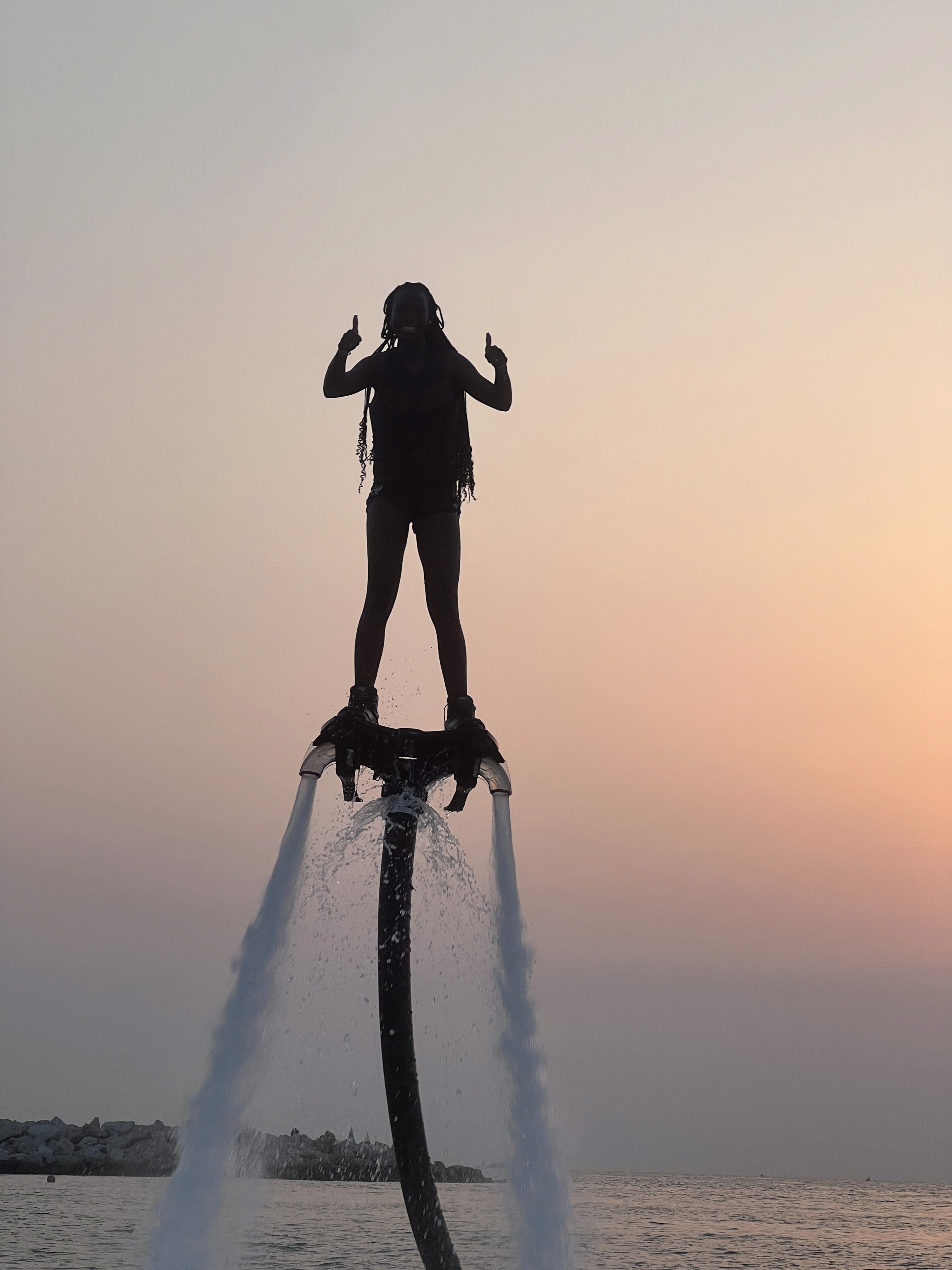Dubai’s #1 Jet Ski
Company
Dubai’s #1 Jet Ski
Company
Tripadvisor Certificate
of Excellence
5.0 Rating From
1500+ Reviews
5.0 Rating From
1500+ Reviews
Fastest Jetskis From
Around The World
Fastest Jetskis in the World
Our Activities
Our Activities
Our Activities
The highest quality service for the best Watersport adventures in Dubai.
*Photo taking is included!
*Discounted prices apply from Monday to Thursday, from 9 am to 11 am.
*Photo taking is included!
*Discounted prices apply from Monday - Thursday from 9am to 11 am
Discover Dubai's beauty from a whole new perspective
Discover Dubai's beauty from a whole new perspective
Discover Dubai's beauty from a whole new perspective


Certificate
of Excellence
Certificate of Excellence
Certificate of Excellence
With 350+ postive TripAdvisor reviews and a Certificate of Excellence, you're guaranteed an exceptional ride. Book now and experience the thrill firsthand!
With 350+ postive TripAdvisor reviews and a Certificate of Excellence, you're guaranteed an exceptional ride. Book now and experience the thrill firsthand!
With 350+ postive TripAdvisor reviews and a Certificate of Excellence, you're guaranteed an exceptional ride. Book now and experience the thrill firsthand!
With 350+ postive TripAdvisor reviews and a Certificate of Excellence, you're guaranteed an exceptional ride. Book now and experience the thrill firsthand!





















Unleash Adventure with Our
Jet-Powered Excursions
Unleash Adventure with Our
Jet-Powered Excursions
Expl re
Explore
Explore
About Ride in Dubai
Make your Dubai Tour Unforgettable
Make your Dubai Tour Unforgettable
About Ride in Dubai
Make your Dubai Tour Unforgettable
Flyboard
Flyboard
Flyboard
Experience the ultimate adrenaline rush as you soar above Dubai’s crystal-clear waters.
Harness the power of the waves and feel like a superhero as you glide, dive, and rise into the sky. This is not just an activity—it’s an unforgettable adventure!




5.0
5.0
From 1500+ Google Reviews
5.0
From 1500+ Google Reviews
Absolutely brilliant. Definitely recommend for anyone in, or visiting, Dubai. Fantastic experience and wonderful staff
Ciaran McCauley

We are happy and we have an awesome experience with my friend. It was our first time jet skating. Sooo amazing and worth it the price! Also thanks to the captain all the good photos and videos he took. thanks and best regards
Jolly Kikay

Amazing experience with Ride in Dubai! Had an amazing guide called Roland who was very experienced and took us to lots of landmarks and took amazing photos! Also the Jet Skis were really fast, really good equipment! Best day so far in Dubai can’t wait to come again!
Umeya Yvan

Absolutely brilliant. Definitely recommend for anyone in, or visiting, Dubai. Fantastic experience and wonderful staff
Ciaran McCauley

We are happy and we have an awesome experience with my friend. It was our first time jet skating. Sooo amazing and worth it the price! Also thanks to the captain all the good photos and videos he took. thanks and best regards
Jolly Kikay

Amazing experience with Ride in Dubai! Had an amazing guide called Roland who was very experienced and took us to lots of landmarks and took amazing photos! Also the Jet Skis were really fast, really good equipment! Best day so far in Dubai can’t wait to come again!
Umeya Yvan

Absolutely brilliant. Definitely recommend for anyone in, or visiting, Dubai. Fantastic experience and wonderful staff
Ciaran McCauley

We are happy and we have an awesome experience with my friend. It was our first time jet skating. Sooo amazing and worth it the price! Also thanks to the captain all the good photos and videos he took. thanks and best regards
Jolly Kikay

Amazing experience with Ride in Dubai! Had an amazing guide called Roland who was very experienced and took us to lots of landmarks and took amazing photos! Also the Jet Skis were really fast, really good equipment! Best day so far in Dubai can’t wait to come again!
Umeya Yvan

Absolutely brilliant. Definitely recommend for anyone in, or visiting, Dubai. Fantastic experience and wonderful staff
Ciaran McCauley

We are happy and we have an awesome experience with my friend. It was our first time jet skating. Sooo amazing and worth it the price! Also thanks to the captain all the good photos and videos he took. thanks and best regards
Jolly Kikay

Amazing experience with Ride in Dubai! Had an amazing guide called Roland who was very experienced and took us to lots of landmarks and took amazing photos! Also the Jet Skis were really fast, really good equipment! Best day so far in Dubai can’t wait to come again!
Umeya Yvan

Absolutely brilliant. Definitely recommend for anyone in, or visiting, Dubai. Fantastic experience and wonderful staff
Ciaran McCauley

We are happy and we have an awesome experience with my friend. It was our first time jet skating. Sooo amazing and worth it the price! Also thanks to the captain all the good photos and videos he took. thanks and best regards
Jolly Kikay

Amazing experience with Ride in Dubai! Had an amazing guide called Roland who was very experienced and took us to lots of landmarks and took amazing photos! Also the Jet Skis were really fast, really good equipment! Best day so far in Dubai can’t wait to come again!
Umeya Yvan

Absolutely brilliant. Definitely recommend for anyone in, or visiting, Dubai. Fantastic experience and wonderful staff
Ciaran McCauley

We are happy and we have an awesome experience with my friend. It was our first time jet skating. Sooo amazing and worth it the price! Also thanks to the captain all the good photos and videos he took. thanks and best regards
Jolly Kikay

Amazing experience with Ride in Dubai! Had an amazing guide called Roland who was very experienced and took us to lots of landmarks and took amazing photos! Also the Jet Skis were really fast, really good equipment! Best day so far in Dubai can’t wait to come again!
Umeya Yvan

Absolutely brilliant. Definitely recommend for anyone in, or visiting, Dubai. Fantastic experience and wonderful staff
Ciaran McCauley

We are happy and we have an awesome experience with my friend. It was our first time jet skating. Sooo amazing and worth it the price! Also thanks to the captain all the good photos and videos he took. thanks and best regards
Jolly Kikay

Amazing experience with Ride in Dubai! Had an amazing guide called Roland who was very experienced and took us to lots of landmarks and took amazing photos! Also the Jet Skis were really fast, really good equipment! Best day so far in Dubai can’t wait to come again!
Umeya Yvan

Absolutely brilliant. Definitely recommend for anyone in, or visiting, Dubai. Fantastic experience and wonderful staff
Ciaran McCauley

We are happy and we have an awesome experience with my friend. It was our first time jet skating. Sooo amazing and worth it the price! Also thanks to the captain all the good photos and videos he took. thanks and best regards
Jolly Kikay

Amazing experience with Ride in Dubai! Had an amazing guide called Roland who was very experienced and took us to lots of landmarks and took amazing photos! Also the Jet Skis were really fast, really good equipment! Best day so far in Dubai can’t wait to come again!
Umeya Yvan

Amazing experience with Ride in Dubai! Had an amazing guide called Roland who was very experienced and took us to lots of landmarks and took amazing photos! Also the Jet Skis were really fast, really good equipment! Best day so far in Dubai can’t wait to come again!
Umeya Yvan

Absolutely brilliant. Definitely recommend for anyone in, or visiting, Dubai. Fantastic experience and wonderful staff
Ciaran McCauley

We are happy and we have an awesome experience with my friend. It was our first time jet skating. Sooo amazing and worth it the price! Also thanks to the captain all the good photos and videos he took. thanks and best regards
Jolly Kikay

Amazing experience with Ride in Dubai! Had an amazing guide called Roland who was very experienced and took us to lots of landmarks and took amazing photos! Also the Jet Skis were really fast, really good equipment! Best day so far in Dubai can’t wait to come again!
Umeya Yvan

Absolutely brilliant. Definitely recommend for anyone in, or visiting, Dubai. Fantastic experience and wonderful staff
Ciaran McCauley

We are happy and we have an awesome experience with my friend. It was our first time jet skating. Sooo amazing and worth it the price! Also thanks to the captain all the good photos and videos he took. thanks and best regards
Jolly Kikay

Amazing experience with Ride in Dubai! Had an amazing guide called Roland who was very experienced and took us to lots of landmarks and took amazing photos! Also the Jet Skis were really fast, really good equipment! Best day so far in Dubai can’t wait to come again!
Umeya Yvan

Absolutely brilliant. Definitely recommend for anyone in, or visiting, Dubai. Fantastic experience and wonderful staff
Ciaran McCauley

We are happy and we have an awesome experience with my friend. It was our first time jet skating. Sooo amazing and worth it the price! Also thanks to the captain all the good photos and videos he took. thanks and best regards
Jolly Kikay

Amazing experience with Ride in Dubai! Had an amazing guide called Roland who was very experienced and took us to lots of landmarks and took amazing photos! Also the Jet Skis were really fast, really good equipment! Best day so far in Dubai can’t wait to come again!
Umeya Yvan

Absolutely brilliant. Definitely recommend for anyone in, or visiting, Dubai. Fantastic experience and wonderful staff
Ciaran McCauley

We are happy and we have an awesome experience with my friend. It was our first time jet skating. Sooo amazing and worth it the price! Also thanks to the captain all the good photos and videos he took. thanks and best regards
Jolly Kikay

Experience Thrills Beyond Imagination
Experience Thrills Beyond Imagination




Got Questions?
We've Got Answers!
Got Questions?
We've Got Answers!
Got Questions? We've Got Answers!
Can I try jet ski and flyboarding in Dubai if I don’t know how to swim?
Do you provide a combo of jet ski and flyboarding?
Can a beginner go for jet ski rental?
What is the minimum age to drive a jet ski?
Are your rates per person?
What are your operating hours?
Do you provide amenities like parking, lockers, changing rooms, and showers?
Can guests go on a self-guided jet ski tour?
What are the requirements for flyboarding? Is there an age limit, weight limit, or shoe size requirement?
What do I need to wear for jet skiing and flyboarding?
Is it necessary to wear a life jacket?
Can I try jet ski and flyboarding in Dubai if I don’t know how to swim?
Do you provide a combo of jet ski and flyboarding?
Can a beginner go for jet ski rental?
What is the minimum age to drive a jet ski?
Are your rates per person?
What are your operating hours?
Do you provide amenities like parking, lockers, changing rooms, and showers?
Can guests go on a self-guided jet ski tour?
What are the requirements for flyboarding? Is there an age limit, weight limit, or shoe size requirement?
What do I need to wear for jet skiing and flyboarding?
Is it necessary to wear a life jacket?
Can I try jet ski and flyboarding in Dubai if I don’t know how to swim?
Do you provide a combo of jet ski and flyboarding?
Can a beginner go for jet ski rental?
What is the minimum age to drive a jet ski?
Are your rates per person?
What are your operating hours?
Do you provide amenities like parking, lockers, changing rooms, and showers?
Can guests go on a self-guided jet ski tour?
What are the requirements for flyboarding? Is there an age limit, weight limit, or shoe size requirement?
What do I need to wear for jet skiing and flyboarding?
Is it necessary to wear a life jacket?
Can I try jet ski and flyboarding in Dubai if I don’t know how to swim?
Do you provide a combo of jet ski and flyboarding?
Can a beginner go for jet ski rental?
What is the minimum age to drive a jet ski?
Are your rates per person?
What are your operating hours?
Do you provide amenities like parking, lockers, changing rooms, and showers?
Can guests go on a self-guided jet ski tour?
What are the requirements for flyboarding? Is there an age limit, weight limit, or shoe size requirement?
What do I need to wear for jet skiing and flyboarding?
Is it necessary to wear a life jacket?
Ready?
Ready?

Book Your
Adventure Now!
Experience jet skiing, flyboarding, jet car rides, and more in Dubai's waters.

Book Your
Adventure Now!
Experience jet skiing, flyboarding, jet car rides, and more in Dubai's waters.

Book Your
Adventure Now!
Experience jet skiing, flyboarding, jet car rides, and more in Dubai's waters.

Book Your
Adventure Now!
Experience jet skiing, flyboarding, jet car rides, and more in Dubai's waters.





























